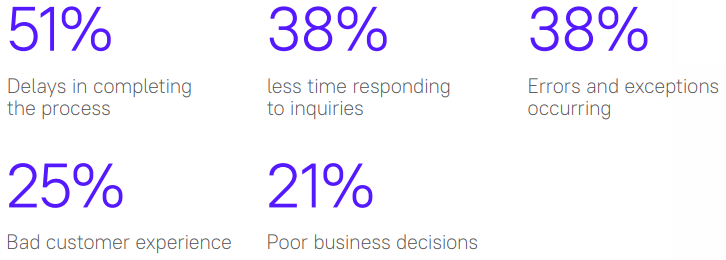Time is all around us, it is one of the most mysterious forces in the universe. What makes time such a precious resource is that you can never get wasted time back. Time has been the theme of great literary works from William Shakespeare to T. S. Eliot, Emily Dickinson, Maya Angelou, and more contemporaries like The Eagles, Collective Soul, and Keith Urban.
So, if time is a fundamental condition of human experience, how can we still tolerate so much wasted time in our day-to-day? How can it be that, in a time when technology envelops our lives, the financial services industry is still so heavily bogged down by time-consuming, manual processes? In processes that we’ve been trying to gain efficiencies for years, such as onboarding, it can still take more than a week—or sometimes, even months to onboard new customers.
Don’t go wasting my precious time
Financial services workers are wasting up to 8 hours per week trying to find, understand, and process data in documents. According to a recent ABBYY survey, this wasted time is resulting in delays in completing important processes, an increase in errors, leaving less time to respond to inquiries, resulting in bad customer experience.

Those surveyed are looking for an intelligent banking automation solution, one that can deal with the many unstructured documents involved in various processes that will enable faster and better decision-making, allow them to work on higher-value projects, and improve customer experience.
The unanimous comment we heard from survey respondents was that they need speed and simplicity, like what can be achieved through an easy drag-and-drop approach to automating document processing.
Turn documents into data with pre-trained, ready-to-use skills
Financial institutions can automate document-intensive processes like account opening and KYC by extracting data from paper-based forms with Intelligent Document Processing (IDP), that easily integrates with the core banking systems. IDP uses artificial-intelligence-based technologies to process structured, semi-structured, and unstructured documents.
IDP can replace manual processing–enabling not only automation, but also creating more efficient ways of interacting with customers–i.e., no-touch, mobile, digital first, anywhere, anytime.
 Implementing a banking digital transformation strategy leveraging low-code / no-code solutions can really change the game, thanks to the advancements of artificial intelligence (AI), machine learning (ML), and natural language processing (NLP).
Implementing a banking digital transformation strategy leveraging low-code / no-code solutions can really change the game, thanks to the advancements of artificial intelligence (AI), machine learning (ML), and natural language processing (NLP).
Leverage the power of the Marketplace
According to Forrester, successful financial institutions will take advantage of partners’ capabilities to move quickly and harness the innovation of others. That is precisely the idea behind the new ABBYY Marketplace, the first digital marketplace for processing and understanding enterprise documents that provides a rich collection of skills, connectors, and assets. Four of the top U.S. banks and many cloud-based companies are providing their business users and citizen developers the best-in-class document and content processing with our easy-to-use, configurable, and pluggable platform, which is ready to use within minutes.
Learn more about how ABBYY is helping financial institutions become more nimble through the power of low-code / no-code.
This article originally appeared on ABBYY.com. Inpute are proud to be partners of ABBYY.
If you’d like to discuss how low code applications can improve your organisation efficiencies get in touch today by emailing solutions@inpute.com.




